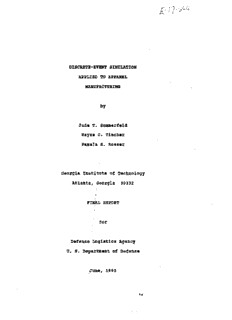
DISCRETE-EVENT SIMULATION APPLIED TO APPAREL PDF
Preview DISCRETE-EVENT SIMULATION APPLIED TO APPAREL
DISCRETE-EVENT SIMULATION APPLIED TO APPAREL MANUFACTURING by Jude T. Sommerfeld Wayne C. Tincher Pamela S. Rosser Georgia Institute of Technology Atlanta, Georgia 30332 FINAL REPORT for Defense Logistics Agency U. S. Department of Defense June, 1990 TABLE OF CONTENTS Page Table of Contents (cid:9) ii List of Tables (cid:9) iv List of Figures (cid:9) vi List of Appendices (cid:9) ix Summary 1 Introduction 2 Queuing Theory 3 Discrete-Event Simulation 4 GPSS Processor (cid:9) 5 Prior Applications (cid:9) 7 Utility Trouser Plant Configuration (cid:9) 9 ii to. TABLE OF CONTENTS (continued) Page Preliminary Modeling Considerations (cid:9) 16 Utility Trouser Plant Model (cid:9) 19 Simulation Results from Utility Trouser Plant Model (cid:9) 33 Hi-Tech Trouser Plant Configuration (cid:9) 42 Hi-Tech Trouser Plant Model (cid:9) 50 Simulation Results from Hi-Tech Trouser Plant Model (cid:9) 63 Conclusions (cid:9) 76 References 78 Appendices 81 (cid:9)(cid:9)(cid:9)(cid:9)(cid:9)(cid:9)(cid:9) LIST OF TABLES Page I (cid:9) Work Stations in Utility Trouser Manufacturing Plant (cid:9) 12 II (cid:9) Production Routes in the Manufacture of Utility Trousers (cid:9) 37 III (cid:9) Manufacturing Residence Times as Functions of the Plant Feed Rate (cid:9) 39 IV (cid:9) Most Utilized Work Stations at Balanced Production Level (40,000 pairs/week or 0.06 min/pair) (cid:9) 41 V (cid:9) Most Crowded Queues at a Balanced (cid:127) Production Level (cid:9) 43 VI (cid:9) Work Stations in Hi-Tech Trouser Manufacturing Plant (cid:9) 46 VII (cid:9) Critical Manufacturing Route in the Production of Trousers.. (cid:9) 65 iv (cid:9)(cid:9) LIST OF TABLES (continued) Page VIII (cid:9) Summary of Effects of Stochasticism on Trouser Production and Inventory (cid:9) 68 (cid:9) IX Key Results from Simulation of Various Production Scenarios (all with 15% Stochasticism) (cid:9) 70 V LIST OF FIGURES Page 1. Material flow configuration for trouser manufac- turing plant. (cid:9) 11 2. GPSS model segment 1 - spreading, cutting and labelling. (cid:9) 20 3. Definition of conceptual QEDAL macro block, representing the sequence of QUEUE - ENTER - DEPART - ADVANCE - LEAVE blocks (cid:9) 23 . 4. GPSS model segment 2 - back pockets. (cid:9) 24 5. GPSS model segment 3 - back panels. (cid:9) 26 6. GPSS model segments 4 - right and left flies - and 5 - front pockets. (cid:9) 28 7. GPSS model segment 6 - front panels and pockets. (cid:9) 29 8. GPSS model segments 7 - waist bands - and 8 - fronts and backs. (cid:9) 30 vi (cid:9) LIST OF FIGURES (continued) Page 9. GPSS model segments 9 - belt loops - and 10 - timer. (cid:9) 32 10. Production and WIP inventories as functions of plant feed rate. (cid:9) 35 11. Material flow configuration for high-technology trouser manufacturing plant. (cid:9) 45 12. GPSS model segment A -- spreading, cutting and bundling. (cid:9) 52 13. Definition of conceptual QEDAAL macro block for operation n, representing the sequence of QUEUE- (cid:9) ENTER-DEPART-ASSIGN-ADVANCE-LEAVE blocks. 55 14. GPSS model segments B -- back pockets -- and C -- back panels. (cid:9) 56 15. GPSS model segments D -- right and left flies -- and E -- front pockets. 58 16. GPSS model segment F -- front panels. (cid:9) 59 vii LIST OF FIGURES (continued) Page 17. GPSS model segment G -- belt loops. (cid:9) 60 18. GPSS model segments H -- finished trousers -- and I -- timer. (cid:9) 62 19. Effect of stochasticism in the individual unit operations on trouser production rate. (cid:9) 67 viii LIST OF APPENDICES Page A (cid:9) Coding for GPSS Model of a Utility Trouser Manufacturing Plant (cid:9) 81 (cid:9) B Sample Output from GPSS Model of a Utility Trouser Manufacturing Plant (Balanced Operation) (cid:9) 88 C (cid:9) Coding for GPSS Model of a Hi-Tech Trouser Manufacturing Plant (cid:9) 96 (cid:9) D Sample Output from GPSS Model of a Hi-Tech Trouser Manufacturing Plant (Base Case of 15% Stochasticism) (cid:9) 103 (cid:9) E Sample Output from GPSS Model of a Hi-Tech Trouser Manufacturing Plant (Ideal Case of Perfect Balancing and No Stochasticism) (cid:9) 111 ix SUMMARY This report presents the results of a project directed toward discrete-event simulation of apparel (specifically, trousers) manufacturing. Thus, the first major topic covered is a description of the discrete-event simulation of a utility trouser manufacturing plant. The simulation model, written in the GPSS/PC language, was validated with operating data from a large plant with a nominal production capacity of 40,000 pairs of men's denim trousers per week. Specifically, the simulation results closely agreed with key plant operating figures, such as production rate, number of work stations, work-in-process inventory and residence time in production. This first phase of the project was then followed by the construction of another discrete-event simulation model, again using the GPSS/PC system, to explore various production scenarios in a high-technology trouser plant, with a nominal production capacity of 8,000 pairs per day. Specifically, the effects of stochasticism, deriving from human factors and represented by the normal distribution, in the various cutting and sewing operations were investigated with this second model. Effects measured included production rate, work-in-process (WIP) inventory and manufacturing residence time. Production scenarios simulated were absent workers, new employee training and the introduction of more efficient equipment.
Description: